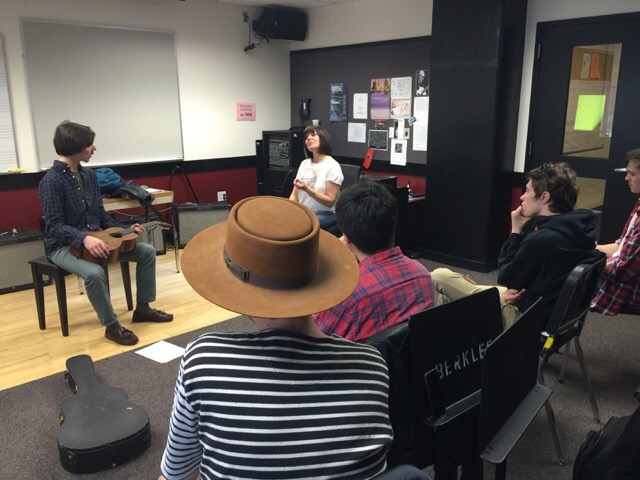VOX BOX: VOCAL MYTHS by Rebecca Shrimpton
By Rebecca Shrimpton, Berklee Voice Faculty
Gems especially for guitarist singer songwriters, from Berklee faculty extraordinaire Rebecca Shrimpton
Myth: Drinking water will hydrate your vocal folds
Drinking water regularly throughout the day will indeed keep your body–vocal folds, mucous membranes, and vocal tract muscles included–hydrated and operating optimally. But remember, NOTHING you swallow actually passes over your vocal folds. They are located in your larynx at the top of the trachea, above your lungs, not in your esophagus, which leads to your stomach. If you did accidentally swallow something past your vocal folds and into your lungs, you would promptly explode into violent coughing, sending hurricane-force blasts of air back up, through your folds. Not a great idea. And chugging water (or tea, honey & lemon, etc.) just before you sing won’t do diddly-squat for your voice, unless you’ve been hydrating well beforehand.
Myth: Drinking hot tea/honey & lemon/throat coat tea soothes your throat

In general, applying heat of any sort to your body brings fluids to that area. If your vocal folds are already swollen, throwing hot anything down there will only aggravate the issue. Hot teas are wonderfully comforting to the soul, but if it’s your voice you’re worried about, chill your tea first. Think of it like a cold compress on a sprained ankle.
And avoid menthol cough drops like the plague. That “cool, refreshing feeling” is the sensation of fluid evaporating from your mucous membranes, not rehydrating them. Slippery Elm Bark lozenges (Thayers is the best known) are natural demulcents, favored by singers for centuries, and will bring moisture to your mouth and soothe the mucous membranes in your throat (but not your vocal folds directly). Or just grab a Lifesavers, Jolly Rancher or other hard candy if you need to get the juices flowing in your mouth.
Myth: When your voice is tired or injured, pamper it by speaking in a whisper
NO! NO! NO! NOOOOOOOOOOOO! Worst. Thing. Ever. Whispering sends heavy blasts of air past your already swollen vocal folds, increasing friction and inflammation and setting your recovery back for days or weeks. Limit your speaking if you can, and speak as clearly as possible and at a slightly higher pitch, in head voice. Avoid speaking or singing heavily in your chest voice and enjoying your Adele or Barry White moment, as those swollen vocal folds might tempt you to do; it only makes things worse.
An active therapy that WILL help is a gentle hum in your lower register. Keep it clean (as in, NO vocal fry or “creaking door” sound), very soft, like you’re humming to yourself, and slide up and down in pitch by, say, a minor 3rd or so. This is akin to a massage for your vocal folds, gently moving out fluids and reducing inflammation. Try it before bed, first thing in the morning, walking between classes, etc. It’s more effective than total silence.
Myth: The voice is an instrument like any other: piano, sax, guitar, etc.
Uh, yes and no. Singing requires the same discipline as any instrumental proficiency. There are a few big differences, though.
First, the voice is a grow-your-own instrument. It’s true that your born with it, but the muscle, bone and cartilage have to grow like the rest of your body. Your larynx, which houses your vocal folds, doesn’t reach its final size until you’re in your early 20s, and the muscles that control the larynx and vocal folds arguably take up to ten more years to fully develop. There’s a reason that the Metropolitan Opera National Council auditions categorize anyone under age 30 as a “young” singer. (So much for teen idols.) Even more importantly, no one gets to own more than one voice. If you break it, there’s no replacement.
Second, most people start singing long before their first formal lesson, or at least they ought to, and “technique” often is not introduced until years later. Everyone should be singing from birth, as far as I’m concerned, but that does mean singers can fall into odd, often stubborn habits that inhibit full use of their voice just like self-taught instrumentalists. What you might think of as your “natural” voice is really the sound you happened to find first, based on instinct, your ability to copy sound, and the music that influenced you.
Third, singers can’t actually see or directly touch their instrument. We must sing by feel, always. We get auditory feedback, but that’s not 100% reliable, since what we hear from inside our skulls isn’t exactly what the audience hears. Having a clear, accurate mental image of vocal anatomy and the way it functions is tremendously important. Think of it like moving around in a darkened room. If you’ve seen the room in daylight, beforehand, you can recreate that mental image in the dark and navigate more smoothly without knocking your shins or breaking a lamp. If you know that room with the detail and intimacy of your childhood bedroom, then you can walk through the door with impunity, dodge the corner of the bed, put your hand on the dresser, open the second drawer, and pick out your favorite socks, all by feel.
Last, and of huge import: singers can only sing what they hear. Unlike external instruments, singers are incapable of making a sound that they haven’t already internalized in some way. Now, good instrumentalists do hear everything they play. But that’s not normally how they start; that’s usually an acquired skill developed from hours and years of brain-to-hand-to-ear connection with their instrument. Singers often have excellent ears and can retain and replicate sound quickly, but for them to “catalogue” those sounds and identify them as specific pitches/scales/chords, they have to learn a secondary instrument, such as piano or guitar, with which they often don’t have as close a relationship. That means singers and instrumentalists often come at their aural skills from different directions.
Myth: My voice just can’t do what other singers’ voices do
It’s true that everyone has a unique sound, created by a combination of personal anatomy and native talent. But that said, everyone has all the same basic moving parts in their larynx. The difference for some is a hair more resonant space, a beautiful or at least interesting texture on their vocal folds, plus a natural talent for mimicking sound and manipulating all those tiny muscles in the vocal tract.
So what bridges that gap for someone with an average voice wanting to become a singer? Sweat equity, some decent instruction, and good musical instincts. Same things you need for any instrument. Barring a serious injury or physical anomaly, your voice can do basically anything you train it to do, given enough time.
Myth: To sing louder, blow harder
Dynamic levels of music are really the combination of the strength of sound waves and the listeners’ perception of resonant qualities. If you sing with a breathy tone, the sound waves won’t carry beyond the front row of the audience without serious help from a mic. Blowing harder with a breathy tone will only shred your vocal folds, without amplifying the sound significantly.
Ever wonder how old-school opera, vaudeville and musical theater singers could carry a note to the back of the house without so much as a body mic, eight shows a week? (Think Ethel Merman or Kirsten Flagstad singing the Ride of the Valkyries–Hoya ta ho OH!) Not that singer-songwriters always want that big of a sound–kind of kills the lyrics, not to mention the vibe–but the vocal resonators that create that volume are used in every music genre, traditional folk to Broadway. Clear up the hyper breathy tone (save it for tender, expressive moments, as a color) and engage the built-in resonators in your vocal tract, and let them do the heavy lifting. You’ll sing with greater control and timbral variety, produce more sound, clear up your intonation, put far less strain on your voice, and still be singing when you’re 90!
Myth: Most women have an alto range
Nope. Natural altos are fairly rare. Most women are mezzo sopranos and sopranos, with average ranges up to A5 and D6, respectively. What many women mistake as an alto range is actually their chest voice, which is only half of their instrument. Even true altos have a head voice and a top range of E5 or so. Now, you may not be planning to whip out a C6 at your next club gig, but don’t sell your voice short, ladies.
Myth: As a songwriter, I can just write for my voice as it is, so I don’t need to expand my range or timbre options. Besides, my natural voice suites my music style.
Yes, you can do that. But you might also find yourself bored and stuck in a rut in a few years, along with your audience. And don’t you want to be just as inspired by your voice as you are by your guitar playing? Wouldn’t you rather write for an expressive, flexible, evolving instrument than a static one? Your ability to sing will change the way you write and think about music. For every new skill a musician gains, his or her artistic sensibilities evolve as well. It’s a symbiotic relationship and the possibilities will blossom in unexpected ways.
Myth: If I learn to sing “properly,” I’ll lose my individuality and natural sound
PART I: I hear this often from folk musicians, but it crops up from students in every style. When you first studied guitar, did you worry about losing your “natural sound”? That wonderfully undeveloped tone from clumsy, novice finger technique? Didn’t think so.
Singing isn’t really the first job of your vocal folds. It’s not even the second. So in that sense, it’s not all that “natural.” And what you think of as your “natural” voice is really the sound you came into through habit, natural facility, and the influence of the music around you. If that happily coalesces into a fully functioning, beautiful instrument without further help, awesome! But most people need some outside guidance. Just because we’re all born with the instrument, doesn’t mean we’re born knowing how to play it.
Like any external instrument, the more intimately you know your voice, the more relaxed and natural you will sound when you play it. Remember that death-grip new players use when they first pick up a guitar? That’s often how inexperienced singers begin, too: with a laryngeal death-grip that tends to strangle what would probably otherwise be a perfectly lovely, “natural” sound. To use your voice well, with comfort, range, and full expression, you need to know it as a separate instrument. Sounding “natural” doesn’t mean you’re untrained.
PART II:
Singing “properly” means singing in a way that is 1) healthful, 2) sustainable over a career and certainly a 3-hour gig, and 3) aesthetically meaningful to the music you’re performing. Good technique does NOT dictate certain styles or require big “singerly” sounds; aesthetics is utterly up to you as an artist. However, if you’re vocally exhausted and losing notes by the end of a gig, straining on high notes, struggling with wobbly pitches, gasping for air at the ends of phrases, struggling with tone/range/dynamics, or writing “around” problem areas of your voice, by definition you can’t possibly be singing properly. You should probably think about fixing that.
Myth: I’ve been playing guitar all my life, so it’s most natural for me to write my songs on it.
One of the first precepts of composition is to know the instruments you’re writing for and compose to their strengths. Writing a melody that sounds gorgeous on your guitar but that you can’t sing well, probably means it will either never be appreciated or someone else will get famous singing it. Learn your way around your voice and write to highlight its best qualities. If you haven’t already, try composing a melody using your voice first. Chances are you’ll find something that feels as good as it sounds. Do the same thing with your lyrics: try them out with your mouth before you commit them to paper. How do they feel, yes, feel in your mouth? How do they sound coming from your voice?
If you do write a song that doesn’t fit well on your voice, think about changing the key, rewriting sections of the melody, or adjusting the lyrics to words that sing well for you. (That is a topic in itself: how particular vowels and consonants effect vocal tone.) That doesn’t mean you should write “down” to your singing level and avoid challenging your vocal skills. Just recognize that you’re writing for a different instrument.
Rebecca Shrimpton at Berklee: coaching guitarist singer songwriter Alex Gasser, while Ole Kirkeng, Luke Robinson, John Cattini and Max Challis look on.

Learn More About Rebecca Shrimpton:
rhshrimpton@gmail.com
info@rebeccashrimpton.com
www.rebeccashrimpton.com




